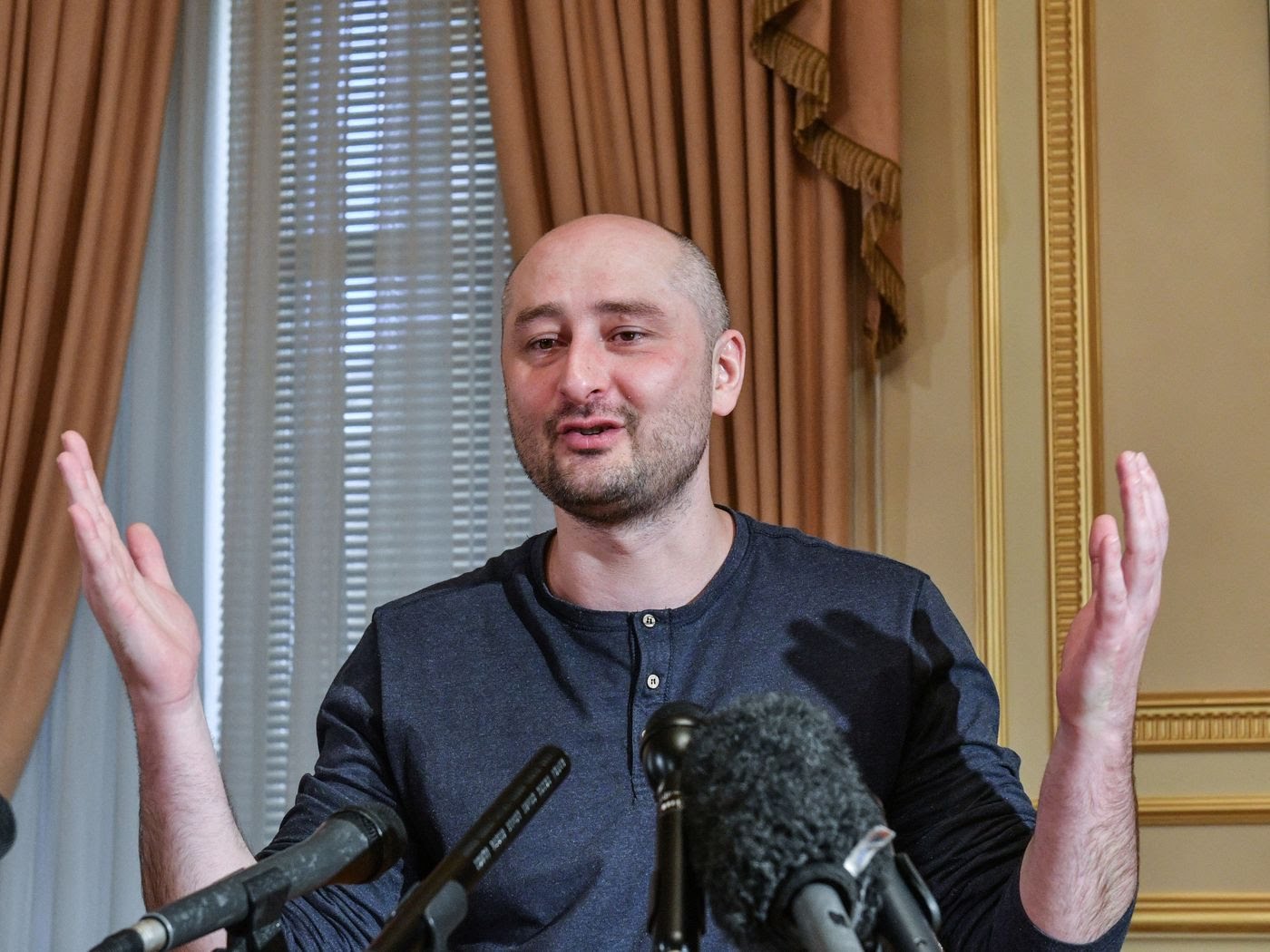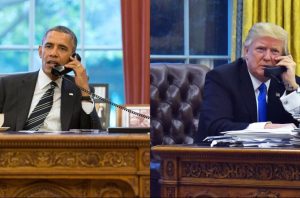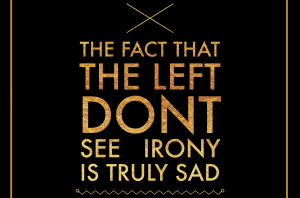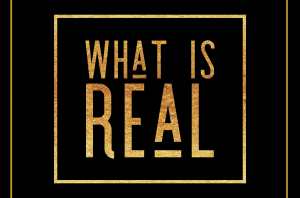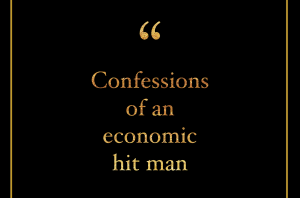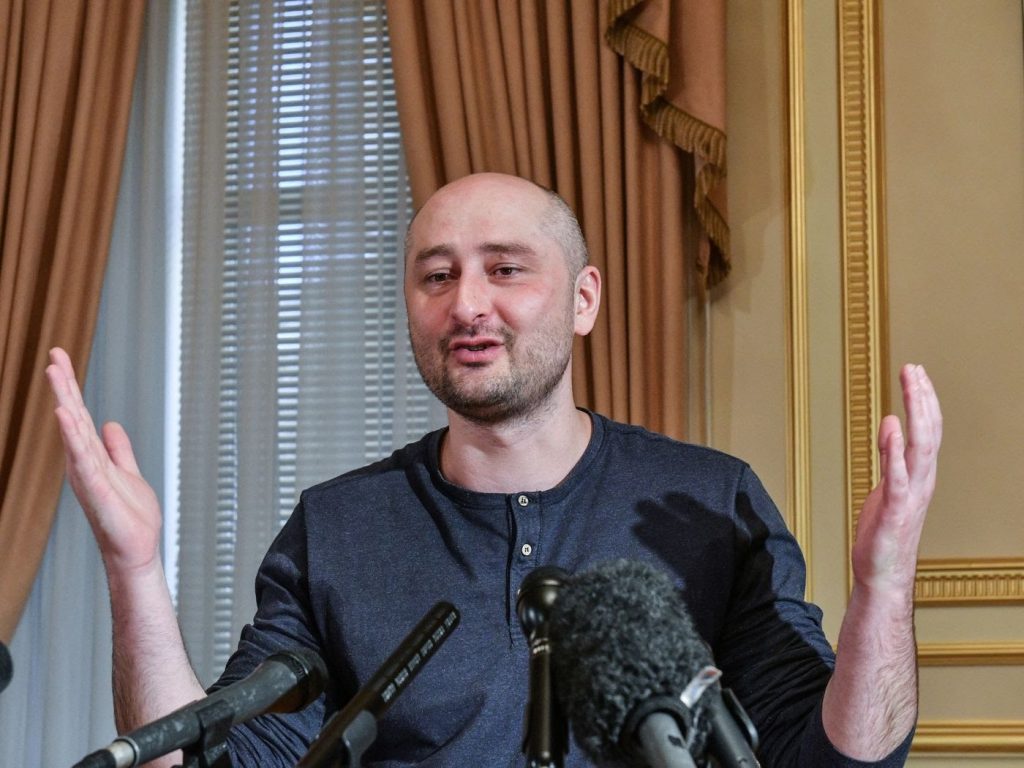
Anti-Kremlin journalist Arkady Babchenko addresses a press conference on May 31, 2018 in Kiev during which he dismissed criticism of cooperating with Ukrainian security services in the staging of his death. GENYA SAVILOV/AFP/Getty Images
Russian journalist Arkady Babchenko was recently found lying face down on the floor of his apartment in Kiev, Ukraine, blood seeping through his T-shirt. He was quickly driven away by an ambulance, pronounced dead, and delivered to a morgue.
But the three bullet holes were fake, and the blood came from a pig — Babchenko was alive.
The day after his “death,” he turned up at a news conference in Kiev, presented by Ukrainian authorities, where a room of journalists awaited details of the murder. He apologized to his wife and others for what he had put them through.
The ruse, orchestrated by Ukrainian Security Service, was designed to expose an alleged murder plot in which Kremlin officials offered a Ukrainian middleman $40,000 for Babchenko’s assassination. Babchenko claims it was necessary for his survival. Since then, questions have been raised about whether the extreme measure was warranted, from organizations like the Committee to Protect Journalists.
While the event may be an extreme example, one thing is true: It is hardly the first time someone has faked their own death. In her book Playing Dead: A Journey Through the World of Death Fraud, Elizabeth Greenwood traced the history of hoax deaths from ancient to modern times.
Today, the majority of such schemes are carried out in order to defraud insurance companies. Greenwood, who is currently working on a nonfiction book about people who seek relationships with prisoners, tells me she thinks Babchenko’s fake death “came from the kind of panicked place that was much more honorable, or much more legitimate, than a lot of what I saw.” We spoke about the different motivations people have to fake a death, how difficult it is to pull off, and how she once acquired her own death certificate from document forgers in the Philippines, among other topics. Our conversation has been edited and condensed for clarity.
Hope Reese
How far back in history have people been staging deaths? Was there a point at which it started becoming more common?
Elizabeth Greenwood
I went back pretty far. One of the founding stories of the Talmud is a fake death. So it’s been in our consciousness and psyches for a very long time. I did notice that when life insurance became a thing, which started to occur in the mid- to late 1800s, people saw an opportunity. There’s lots of cases in very rudimentary schemes in the late 19th century, [of people] faking their deaths and the deaths of friends and loved ones to receive life insurance.
Hope Reese
What were the kinds of reasons people gave for faking their deaths?
Elizabeth Greenwood
They aren’t always criminal masterminds. These are often people who have gotten into some kind of financial or legal trouble and are looking at death fraud as a path — life insurance fraud, people trying to escape prison sentences. I did hear more anecdotally about cases of people — women, for example — who were in domestic violence situations and were trying to save their lives. In many cases, though, that wouldn’t require faking your death. That would just require a very quick, seamless disappearance.
I interviewed privacy expert Frank Ahearn, who’s helped people disappear in his career, and he said that when men seek out his assistance, it’s usually because of money. Either they’ve lost a lot of money or they’ve come into a lot of money, and wanted to disappear. And with women, it was almost always violence. They were really trying to fight for their lives.
Hope Reese
In the cases you looked at, was there a popular way of faking a death? Were there more fake suicides or fake murders?
Elizabeth Greenwood
It was often water accidents, drowning or falling off a fishing boat. These cases are almost always suspicious, especially if the person has been in some kind of legal or financial drama. Almost inevitably in a drowning, a body will wash up, usually in the first few days. So if there’s a drowning when no body appears, it’s very fishy in the eyes of law enforcement.
Hope Reese
How difficult is it, especially today, with credit cards, social media footprints, and smartphone metadata, to completely erase your past?
Elizabeth Greenwood
It’s really hard, and any kind of technological avenue you seek out becomes obsolete moments later. So I think the best advice I’ve heard from experts if you want to disappear is to really limit your use of anything with a digital footprint as much as possible. You don’t have to be on social media. Use computers at the local library. We’ve reached this tipping point where we have all of these technologies at our disposal that some would think aid a disappearance. But more often than not, it’s better to go analog.
Hope Reese
Is there any way to gauge how frequently fake deaths happen? I mean, I guess for those who’ve successfully done it, we would never know about them, right?
Elizabeth Greenwood
Well, that’s exactly right. It’s really hard to come up with numbers on this because people who are successful at death fraud are considered dead. Anecdotally, I interviewed some very elite private investigators where a key of their business is just subcontracting for these life insurance companies and sussing out death fraud claims that are over a certain dollar amount. Just these couple of guys I talked to saw dozens of these cases a year.
I had this Google alert for “fake deaths” since 2011, when I started looking at this topic. And pretty consistently, I get something every few weeks from all over the world. So it does happen more frequently than you would imagine.
Hope Reese
What about the current situation with Babchenko? Did you see anything similar to that — faking a death in order to draw attention to an issue or to protect someone from being murdered?
Elizabeth Greenwood
I didn’t, and that’s why I kind of love this case. I know there’s a lot of disagreement over whether what he did was, in the long term, beneficial for his cause as a journalist. [With] all these fake news sources, people [already] don’t know what to believe. But I think that if he felt his life was at stake, and it sounds like these were some pretty scary dudes, I think what he did was from the kind of panicked place that was much more honorable, or much more legitimate, than a lot of what I saw.
Hope Reese
And you mentioned in an NPR interviewthat there’s this toll that it takes on the family and friends.
Elizabeth Greenwood
What I observed in speaking to people who have had experience with it is that there’s a lot of anger. In some cases, people do reconcile with their families, and in other cases, they do not. They see it as an unforgivable offense.
Hope Reese
Public trust in the media is currently at a low. Could Babchenko’s fake death provide a reason for further skepticism?
Elizabeth Greenwood
All I can do is sympathize with the state of mind Babchenko must have been in. If he felt his life was threatened, journalist or not, he went into survival mode. So I think a bigger question is asking why governments are having journalists assassinated. That doesn’t inspire trust in information systems either. So I’m hesitant to place blame on Babchenko personally. I do understand that criticism, but I see it more about a personal choice he was making.
Hope Reese
You were initially curious about the idea of faking your own death to escape student loans, and then traveled to the Philippines to see how easy it would be to have a fake death certificate created, and ended up getting one that says you died in a car crash in Manila on July 2, 2013. I’m really interested in what the black market is for that — who’s doing it? How high is the demand?
Elizabeth Greenwood
I can’t really tell you definitively when the black market emerged. [It happens in] lots of countries, including the United States. It’s not necessarily a specific “black market” location. It’s usually people who are government officials, or work for the government obtaining documents, who are siphoning away official letterheads, licenses, or other documents people need for these kinds of crimes, and then divvying them out as needed.
I’d heard the Philippines mentioned from a lot of the investigators I’d spoken with. And those places [sources of fake death documents] change — there will be an uptick for a while in Mexico, and then there’ll be an uptick in India. I did read an article in the Wall Street Journal from 1987, when I started doing my research. [The reporter] interviewed a fraud investigator, who mentioned that in certain Southeast Asian countries there are these makeshift morgues where people will bring in dead derelicts and keep them on ice until someone comes around and wants to buy a body to try to cremate and pass off as themselves. And that totally intrigued me.
Hope Reese
So how exactly did you get your own death certificate? How did you find the person and what was the process?
Elizabeth Greenwood
I had two guys who work in the Philippines as kind of local fixers for fraud investigators. These guys have connections on both sides of things — like with law enforcement and with forgers, and other connections that way. So they helped me out.
Hope Reese
How much did it cost?
Elizabeth Greenwood
I actually didn’t pay for it. They gave it to me on the house. It would’ve cost about $150.
Hope Reese
So would that certificate have been valid anywhere in the world?
Elizabeth Greenwood
Well, since I’m American, I would’ve had to have filed it with the US Embassy first. Yeah, and that’s usually the protocol, wherever you hail from.
Hope Reese
So after you got that document, what did it feel like?
Elizabeth Greenwood
It felt crazy. I mean, the whole time, I was so fixated on, “Am I gonna get something? Am I gonna get what I need?” Because I was on a tight timetable too. I only had a couple of days, so it was really just kind of, you know, you’re a journalist, you want to get a story. And so I wasn’t even thinking about, “What will this feel like,” existentially. But then once I had it in my hands and saw everything typed out in this very clerical, cold boxes, it was really like, “Oh, no, I don’t want to die.”
Hope Reese
Do you still have the certificate? Did you have to “undo” it somehow?
Elizabeth Greenwood
I never filed it, so there’s nothing to undo. But I do have it. It is in my filing cabinet.
Hope Reese is a journalist in Louisville, Kentucky. Her writing has appeared in the Atlantic, the Boston Globe, the Chicago Tribune, Playboy, Vox, and other publications. Find her on Twitter @hope_reese.

